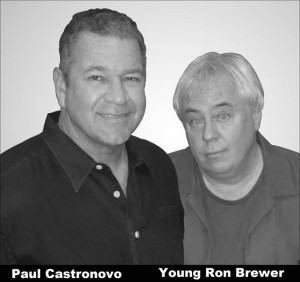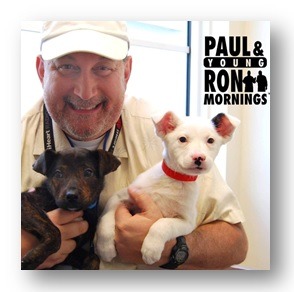 Sometimes the best strategies and advice come from someone outside the business. In the case of a recent Fast Company article about identifying and managing two-person teams, Rich Karlgaard and Michael S. Malone unknowingly wrote a primer for radio programmers. These guys actually wrote the book on it – Team Genius – which breaks down how partnerships can be effective, especially those that pull together opposites.
Sometimes the best strategies and advice come from someone outside the business. In the case of a recent Fast Company article about identifying and managing two-person teams, Rich Karlgaard and Michael S. Malone unknowingly wrote a primer for radio programmers. These guys actually wrote the book on it – Team Genius – which breaks down how partnerships can be effective, especially those that pull together opposites.
Thanks to Steve Harmon, morning producer of the Paul & Young Ron Show at WBGG/Miami, for pointing this great management advice, much of it applying to the type of show that he helps guide every morning.
PDs struggle all the time with putting together that perfect two-person show, often trying to come up with the right chemistry that will connect with audiences. The authors offer three rules to keep in mind when considering a team:
- All pairs are not alike.
- Don’t recruit pairs based solely on compatibility or by intuition.
- Some of the most successful pairs don’t always fit our expectations.
We intuitively know this from managing, observing, and coaching radio shows. Sometimes things don’t work as mapped out, and at other times, we’re surprised by how an odd couple of DJs can end up playing off each other to create a truly great show.
But beyond selecting the right two people, Karlgaard and Malone note that it’s how you coach, manage, and prep a team that makes all the difference. While not all of their guideposts translate directly to coaching two-person DJ teams, many of them are on-point, including these:
Identify the need – In this case, the authors are talking about the need to define the essence of the team. Thinking about radio, is the concept of the pairing unique to the market, and even the cluster? If there’s already something pretty similar in town, you might want to go back to the personality drawing board and create something that will stand out.
Prepare the candidates – I see PDs drop the ball on this one in the first inning of new shows. Team members who don’t “recognize or respect one another’s achievements” is a common problem. For radio, it is always amazing to me when programmers “shotgun” a couple of people who don’t really know one another, and don’t take the time to let them get acquainted. The more they know about each other’s quirks, traits, talents, personal lives, and histories, the better they’ll be able to connect and create magic in the studio.
Determine the goal – “Do a good show” isn’t a goal, it’s a hope. What are PDs trying to accomplish? Is it about establishing benchmarks, is it about getting the show out in public, or is it about something else? Personalities and teams perform better when they know what’s on the line.

Manage with the right intensity – As the authors point out, “Finding the right manager is often as important as selecting the right team.” The tone of the PD is especially important in the launch of a show, and keeping it on track for growth. Personality shows quietly make a determination during the first few weeks about whether the PD can bring something to their show – or not. It is critical for programmers to do more than “atta boys” or aircheck sessions. Adding to the equity of the team, providing assets from the station, and helping them succeed go to the heart of the PD’s real value.
Stay observant – A key is recognizing the potential of talent – before they are formed into teams. Identifying potential chemistry is essential to creating a new show, or morphing an existing show when a replacement need to be made for whatever the reasons.
Create opportunities – The program director (and staff) has the ability to put teams in a position to win – or lose. An audience remote can be a chance to look great in front of a lot of people…or a chance to stiff because of an event that was poorly planned and sparcely attended. It is critical – especially at the beginning – to put teams in situations that build their confidence and encourage them to do more.
Keep a record of successes and failures – This means more than tracking the ratings (although that is part of the analysis process, too). How do various events, bits, and benchmarks perform? Where is the team strong, and how can a PD maximize opportunities to score again…and again. Talent doesn’t always recognize what’s working, and that’s where a programmer can encourage them to keep going – or cut off a bit before it becomes toxic.
Manage transitions – The authors talk about how pairs/teams have lifecycles and they change over time. Managing them the same way year in and year out misses the dynamic of change. The same is even truer for personality shows that move along with life changes that talent experience, and the ebb and flow of the show. Every show has its unique evolution. Understanding that change is a key to managing it. Research can help identify these changes, but an observant manager tends to know how shows are flowing before the data is generated.
And in considering this Fast Company piece on understanding, building, and managing team talent, here are a few extra credit guides courtesy of yours truly:
Know who’s in charge – On most teams, there’s an alpha dog who ultimately makes the calls. It’s great when you have two (or more) people coming up with ideas, prepping, and producing concepts. But ultimately, there has to be someone giving the nod to or taking the ax to bits, which also helps in the overall management of the show. Someone has to own these decisions.
Encourage they spend time together – Too often, new shows don’t have much face time or phone contact after the show. There’s nothing like an occasional dinner, movie, or concert where the team members can hang out with each other. And insist they touch base with each other at least once a day after leaving the station so they’re not organizing the show at 5am. Time spent with one another is often where the chemistry happens.
 Respect the relationship – The only thing more challenging than keeping a marriage on track is helping a personality show navigate the turbulent partnership waters. It’s difficult spending that much pressurized time with another person, and not at all surprising when tempers flare and emotions run hot (or cold). At varying points on the curve, the PD needs to play the role of marriage counselor, referee, or even father confessor. Understand that over the course of time, there are going to be days when you can and need to make a difference.
Respect the relationship – The only thing more challenging than keeping a marriage on track is helping a personality show navigate the turbulent partnership waters. It’s difficult spending that much pressurized time with another person, and not at all surprising when tempers flare and emotions run hot (or cold). At varying points on the curve, the PD needs to play the role of marriage counselor, referee, or even father confessor. Understand that over the course of time, there are going to be days when you can and need to make a difference.
Get a great producer – This is Steve Harmon’s self-serving recommendation (pictured right), and it’s a good one. Every radio team needs a smart, savvy “backend” – someone who can provide support, dependability, guidance, a shoulder to cry on, loads of prep, and lots of energy. A producer who understands his/her role and can deftly navigate the drama, keep the show on track, and yes, provide important feedback to the PD who doesn’t always know what’s really going on.
What advice can you add in your quest to either be a great team or manage one?
And who are the best two-person teams you’ve ever worked with?
- What To Do If Your Radio Station Goes Through A Midlife Crisis - April 25, 2025
- A 2020 Lesson?It Could All Be Gone In A Flash - April 24, 2025
- How AI Can Give Radio Personalities More…PERSONALITY - April 23, 2025




Loren & Walley, WVBF now WROR Boston! Complementary, caring, VERY funny guys with creativity, lightning tight wit and great radio comedy. In fact, a lasting featurette “Men From Maine” done in :60 or less, was so hysterically credible…my son Jeff, hearing it for years while being driven to high school, wouldn’t even visit – let alone apply to – any of the excellent colleges in Maine!! LMAO.
They are one of the best, Clark. Thanks for bringing them up.
Great post, Fred. Something else I’ve noticed over the years is that, with time, the successful duo will spend less and less time together outside of work, choosing to “save” their interaction for the show. Even to the point where they don’t socialize with one another except at important life events like weddings, etc. Perfectly natural, and really does become a part of the successful formula.
Are you describing marriage or radio shows? Seriously, Keith, thanks for the comment.
Some objective perspective:
Most of the successful, great, classic, etc., morning show pairings did not survive and/or thrive once PPM came along.
What was…won’t work.
Simple…real…honest…and a command of the obvious is what will work today.
Millions are out there waiting to listen.
PPM creates a different rhythm. It has been fascinating for me to watch Mark Thompson (KSWD/Los Angeles, and pictured in the post with his team), make the adjustment from the traditional two-man team to an ensemble cast that plays music and has made the transition. Thanks for the comment, Marty.
As always, great work, Fred. Taking my first PD gig in a new city, I was paired with a relative newcomer to the biz for the morning show and I had concerns on Day One. Fortunately, we developed a great rapport in a short period of time. While I was the “alpha dog”, as Steve describes, I treated her as an equal when it came to content. However, money became an issue for her and she left the station a few months later. More than ten years have passed, but we still keep in touch and we swap great stories about our time together.
I think everyone who has ever been partnered with others on the air has lasting memories – hopefully good ones – of what it was like to be married on the radio. It is truly a challenging gig that can also be memorable and rewarding. Thanks for the perspective.